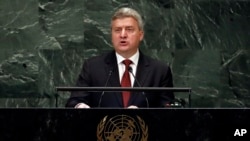Macedonia’s President Gjorge Ivanov on Thursday called a national referendum on changing his country's name “historical suicide” and is urging Macedonians to boycott to vote.
Macedonians are being asked to change the name of their country to North Macedonia to end a decades-old dispute with neighboring Greece and pave the way for the country's admission into the European Union and NATO.
Ivanov's comments came in his speech before the U.N. General Assembly in New York just days before the end of campaigning for Sunday's vote.
"It is a censorship of the world and an auto-censorship of the collective conscience of Macedonian people. It is violence against our historical memory. There are hundreds of thousands of pages of documents and testimonies in the U.N. archives, detailing what the Greek state used to do to Macedonians in Greece. Now … the Greek state wants to do the same to the Macedonians in the Republic of Macedonia."
Ivanov, who heads Macedonia's nationalist opposition party, has steadfastly refused to back a deal reached between Macedonian Prime Minister Zoran Zaev and his Greek counterpart Alexis Tsipras that puts the name change to a vote, which many observers view as a proxy battle between the West and Russia over the small Balkan nation's Euro-Atlantic aspirations.
"The Republic of Macedonia is now asked to commit a legal and historical suicide so that the legal abolishment of Macedonian people can then be interpreted as its own will," said Ivanov, who equated the deal with Athens to a "flagrant violation of sovereignty.''
Walk-out
During Ivanov’s speech, Macedonia's Deputy Foreign Minister Andrej Zernovski, who is aligned with Zaev's ruling party, exited the U.N. General Assembly in protest, along with colleagues who also support Macedonia's prospective EU and NATO integration.
"We left because we didn't want to give legitimacy to [Ivanov's] scandalous speech," Zernovski told VOA's Macedonian Service outside of United Nations headquarters. "It was filled with manipulation and prompts the spreading of hatred and making enemies instead of allies," he added.
Zernovski said that Ivanov spoke of preserving Macedonia's identity, and argued that that is precisely what the country’s agreement with Greece to put the name change to a vote has accomplished.
Greece and Macedonia have been feuding over the right to use the name Macedonia since the 1991 break-up of Yugoslavia, of which Macedonia was part. Many Greeks say allowing the neighboring country to use the name Macedonia is an insult to Greek history and constitutes a claim on a Greek territory of the same name and a key province in Alexander the Great's ancient empire.
The standoff has caused Greece to block Macedonia’s efforts to join the EU and NATO. Despite recognition by 137 countries, Macedonia is officially known at the United Nations as the Former Yugoslav Republic of Macedonia or FYROM.
This story originated in VOA's Macedonian Service.




